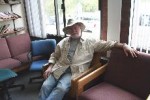Pulitzer winner helping writers

He sat in front of his typewriter staring at the blank yellow paper, unable to tolerate the bareness of a white sheet, searching for a word, a sentence to get down. Years later, that man has a Pulitzer Prize, a New York Times best-seller, and the job of writer-in-residence at Castleton.
“I’m very honored,” Ron Powers said. “I love this college; I respect it a lot.”
As writer in residence, Powers will help aspiring writers hone their skills in a way that cannot be done in a classroom. One of his main focuses will be “real world stuff’ such as interviewing and researching that one will encounter in the writing process.
“I do enjoy mentoring,” he said. “I enjoy sharing ideas with students who really do have a real interest, a real hunger to write.”
One of the biggest obstacles that Powers believes holds new writers back is shyness. He states that all writers need courage to go into “Unknown Territory,” because that is when one’s senses will be on alert, which will allow for more vivid description to come about.
Unknown territory is also the essential place to break away from oneself and his or her memory when writing.
“The thing about that is when you write about yourself, you are talking to yourself in a way and you know so much already that you don’t bother to put it down on paper,” he said.
Powers urges writers to intertwine personal experiences with the outside world.
“That’s the kind of writing I’m talking about and what I’d like to teach is very American,” he said, explaining that motivational writings and memoirs are repetitious.
While Powers has not held the position of writer in residence before, he has presented to a handful of conferences including the Breadloaf Writers’ Conference, which first brought him to Vermont.
After that, he fell in love with the state and moved to Middlebury with his wife Honoree Fleming, Dean of Education.
“Vermont is full of writers,” Powers said. “It’s a really stimulating state to live in. I don’t think people who don’t live here realize that.”
Eventually, Powers and Fleming moved to Castleton. After that, President Dave Wolk got to know him through Fleming and decided with Dean Joe Mark to invite Powers to be the writer in residence.
“He is just a jewel right here in our midst,” Wolk said. “I believe he will be a terrific role model for students who are aspiring writers.”
English department Chair, Dennis Shramek, also believes that Powers could be a valuable help to students.
“We thought it would be very interesting and useful for students in the liberal arts to listen and to work with Ron,” he said.
Candy Daniels, president of the literary club, agrees.
“I look forward to having a conversation or two with him,” she said, adding that she hopes to get him as a guest speaker or to present a workshop to the literary club.
This is not the first time Powers’ name has been associated with Castleton’s. His most powerful moment in his career took place in Vermont when Castleton played host to the state’s premiere of the film “Flags of Our Fathers,” adapted from the New York Times best-seller which Powers co-authored.
“That is pure Castleton College. That’s one of the things that makes this place special,” the author said of bringing more than 1,000 veterans to the Casella Theater for the movie.
Wolk believes the premiere would not have happened at Castleton if it weren’t for Powers help.
Although “Flags of Our Fathers” brought Powers success, it wasn’t always easy.
Since Powers grew up in Hannibal, Mo., hometown of Mark Twain, his editor wanted him to write a biography about Twain. With over 40 other biographies about Twain, Powers didn’t think he had anything to add, until he decided to look into Twain’s life instead of “psychoanalyze” the man.
“I enjoyed putting him on stage and stepping aside, letting the reader get to know him, the way he talked, the way he thought, the way he matured, the way he shed off the racism that he grew up with, and the way, the wonderful way that he used words,” Powers said
While he was working on his 720-page biography of Twain, Powers became adamant about nailing the story.
“The relationship with it is so intimate so all consuming that you want to get every word right,” he said. “I struggled over every sentence. I’m not saying it’s brilliant, but I struggled.”
He was not enamored with his first book, and it took him until his third book, “White Town Drowsing” to make his way as a writer.
“That was the book that told me maybe I could be a real writer, not just a journalist writing a book,” Powers said.
Even while he was a journalist and drawing cartoons of his high school buddies, he knew that he wanted to write books.
“From early age my dream was to write a book,” Powers said. “I never had enough confidence in myself to believe that I could. You just keep at it and it happens.”
Powers admits he has a hard time starting a piece of work, which is why he couldn’t stand the whiteness of a blank paper, but persistence pays off.
“There’s a lot of times that you want to give up or you don’t think it’s working, but sometimes when you get enough down or on your hard drive, even if it’s bad writing, the book starts to emerge and starts to tell you what it wants to be,” Powers said. “It says hello here I am.





